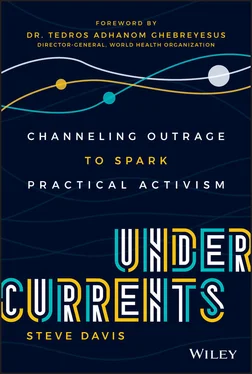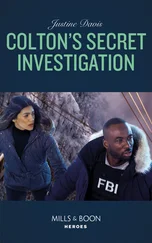Though it has caused immense suffering, COVID‐19 has also demonstrated the extraordinary genius, sacrifice, and compassion that exist within our fellow human beings across the globe. Every day of the crisis I've learned of more ingenious approaches to tackling problems associated with the disease and new forms of social activism to address its many dimensions. Each day I've heard stories of tireless bravery on the part of health workers and others at the frontlines of the pandemic. I've learned of social entrepreneurs developing new tools, students organizing to help each other, community associations rallying to take care of people in their neighborhoods, artists making heartening messages, and companies willing to do “whatever it takes” to help the World Health Organization in its fight against the crisis. Across the planet, activists emerged to do simple, practical, often unheralded acts to change our world for the better.
I can't think of a better moment to have Steve Davis's book, Undercurrents: Channeling Outrage to Spark Practical Activism, on my night table. It reminds me that we need to keep channeling our outrage into service and commitment in big ways and in small ones. As we look beyond the pandemic to the many challenges facing our planet in the decade ahead—particularly as we march toward the ambitious commitments of the United Nations' 2030 Sustainable Development Goals—we will need more and more activists to come forward, or be recharged, as they address the inequities across the globe. The five undercurrents set forth in this book are powerful trends that will help us all find ways to engage and serve.
I first met Steve when he was the leader of the amazing global health innovation organization PATH. He'd stepped into global health leadership with new ideas and boundless energy. Coming from a diverse background—as a human rights lawyer, global tech leader, and McKinsey consultant—Steve impressed me with his agile mind, keen insights, enthusiasm for innovation, and determined activism. I later asked him to co‐chair the WHO Digital Health Technical Advisory Group, because I knew his recommendations would help to make the WHO a stronger force for digital leadership worldwide. In that role, he would provide useful guidance to all 198 member states in shaping their digital health transformation. This is no small task, given the many complex issues around digital health in different settings—among them, data governance, privacy, interoperability, and ethics in AI research. But I could think of no one better suited to it. That confidence has been borne out again and again. Daily, my colleagues and I witness Steve's behind‐the‐scenes “practical activism” as he helps us and so many others respond to the pandemic while never losing sight of longer‐term opportunities and strategies to use digital tools for advancing the well‐being of people around the world. I am thrilled that Steve decided to share some of those thoughts with all of us through writing this book—in the middle of a pandemic, no less!
From my perspective, the world never stops placing enormous obstacles on our path to progress. I have seen many in my life, from my childhood in Ethiopia, to my work as a public health expert confronting the scourge of malaria, to my role in government and my leadership of the WHO during a global pandemic. But I nonetheless remain optimistic about our ability to step around, leap over, and move beyond each hurdle. It is this spirit of optimism that most resonates with me as I read Undercurrents . Through these stories of creative, high‐impact solutions in global health, education, environment, poverty relief, and gender equality, we see clear themes of courage and hope. But each is presented with an eye toward social change from a practitioner's point of view and a steady dose of pragmatism. That is a powerful combination.
I hope you will find the macrotrends Steve outlines in this book as useful as I do when thinking about our collective future. And I hope you will find your own currents to guide and inspire you. We need each person engaged in our collective work to make a more just, verdant, and healthy world.
Dr. Tedros Adhanom Ghebreyesus
Geneva, Switzerland
May 2020
Introduction From Outrage to Activism
I am fundamentally an optimist. Whether that comes from nature or nurture, I cannot say. Part of being optimistic is keeping one's head pointed toward the sun, one's feet moving forward. There were many dark moments when my faith in humanity was sorely tested, but I would not and could not give myself up to despair. That way lays defeat and death .
—Nelson Mandela
A REFUGEE CAMP sprawling across a large patch of jungle in Thailand is not the first place most people would expect to enjoy a memorable pickup soccer game. Nor the likeliest wellspring for a life‐changing insight. But that is where I embarked on my journey as a practical activist. I wasn't there as a relief worker, just a 22‐year‐old teacher visiting a friend of a friend who was working for the United Nations. It was January 1980. The Vietnam War had ended only five years before, and thousands of families across Southeast Asia were still reeling from dislocation. They were living in camps and trying to recover, find relatives, and make their way to whatever place would next become home.
The phrase “fish out of water” hardly does justice to how out of place I was, with my backpack, travel guides, and long hair. The camp sat near the Mekong River. It was filled with Laotians and Cambodians living in tents connected by dusty roads, scattered wells, and temporary feeding halls. The air smelled of burning wood. Almost everyone around me was homeless, grieving, and confused. Most had no idea how long they would live there and no place else to go. I'd arrived as a clueless, but curious, American.
Two friends and I, on break from our teaching fellowships at Tunghai University in Taiwan, had decided to spend our lunar new year holiday traveling around Southeast Asia on a shoestring budget. We did exactly as you might expect from a trio of adventurous young Americans—hung out on the beaches in Malaysia, island‐hopped on fishing boats off the Gulf of Thailand, trekked across opium fields in the Golden Triangle, crashed in the bustling hostels of Hong Kong, and ate enormous prawns in the night markets of Singapore. One of my companions had a friend who was working at the United Nations High Commission for Refugees (UNHCR) camp in northeast Thailand, so we'd decided to drop in for an impromptu visit.
Because our host was tending to the camp's children through a makeshift education program, I volunteered to occupy the teenagers with a game of soccer, mostly to make myself feel useful. Despite our lack of a common language, we enjoyed an intense and competitive match, refereeing through hand signals and bits of Lao, Thai, English, French, and Chinese—though I was badly outplayed.
“Where you from?” asked the goalie after we'd been kicking the ball around for a while. He looked to be about 16 and had clearly appointed himself leader of the pack.
“America,” I said with some hesitation, given our recent history in the region. While the “killing fields” of Cambodia had faded, the resulting dislocation had affected every village and refugee camp across the region.
“Oh, U.S. We love U.S.!” he replied, grinning. “America's great. We all want to go to America!”
“Where are you from?” I asked.
“Luang Prabang. But I have no home now,” he said. “My parents are gone, but I'm okay.”
Though he was just a few years younger than me, I wondered how much this teenager could possibly know about the whereabouts of his family, the complexities of world politics, or the future that might befall him. Frankly, I was treating him like a child, a hapless victim, stumbling through my silly grade school questions spoken too loud and too slow. I'll say it plainly: my innocence and arrogance were obvious. Born and raised in small‐town Montana, educated at an Ivy League university, I was open to new experiences but wildly naïve about human suffering across the world—not to mention nuanced notions of justice, dignity, and grace. The teenage goalie seemed to understand and, thankfully, cut me off.
Читать дальше












